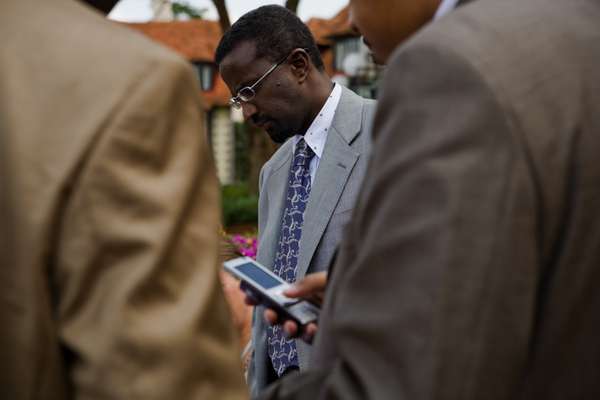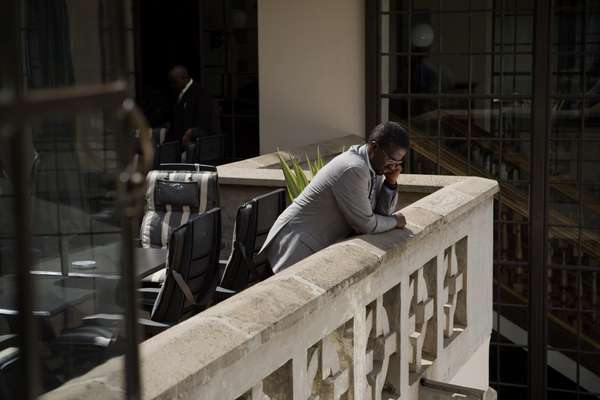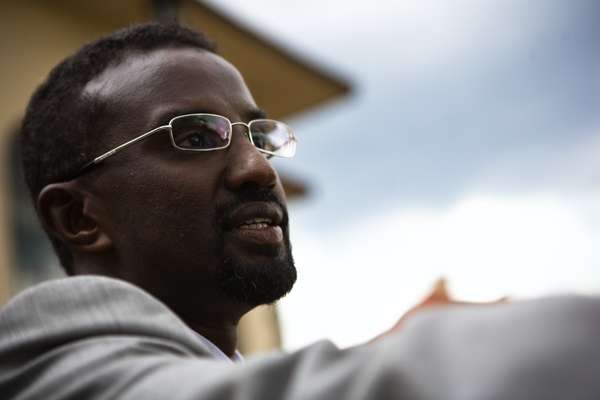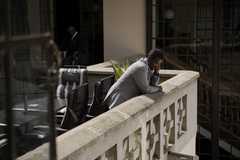Ahmed Abdisalam Adan / Somalia
Wanted man
As a former radio journalist, Ahmed Abdisalam Adan has faced death threats and seen colleagues killed. Now, he is deputy prime minister in Somalia’s first functioning government since 1991. He tells Monocle about life in a humanitarian disaster zone.
When Monocle finds Ahmed Abdisalam Adan in the foyer of a Nairobi hotel, he is deep in conversation with a man who once tried to kill him. More than once, actually. The Somali journalist turned deputy prime minister made countless enemies when he and two friends established the radio station HornAfrik.
The men had fled Somalia at the end of the 1980s as the country fell into anarchy. But in 1999, after a decade living in Ottawa, they returned. Adan and his colleagues swapped their clean and safe refuge for death threats and danger.
The warlords who ran Somalia’s capital Mogadishu, including the man now bending Adan’s ear, were angered by HornAfrik’s independent journalism. And they did not appreciate its critical phone-in shows either.
Recently appointed Somalia’s deputy prime minister, Adan is now courted by the people who once wanted him dead. But as well as making new friends, Adan is also gaining new enemies.
The Transitional Federal Government was installed in Mogadishu in January 2007 following a US-backed invasion by Ethiopian troops, which drove out the Union of Islamic Courts. The government was not elected. It was established with the backing of the UN after 13 previous attempts since 1991 to form a functioning central government had failed. Already lacking popular support, backing from Ethiopia has not gone down well. Within weeks of the government entering Mogadishu, militia fighters linked to the Islamic Courts and a jihadist group known as Al Shabbab launched an insurgency. Almost 18 months on it shows no sign of slowing.
Somalia is now considered to be one of Africa’s worst humanitarian disasters and many consider the government to be more of a problem than a solution. President Abdullahi Yusuf Ahmed calls the opposition “terrorists” and is accused of preventing UN and aid agencies from delivering food and assistance.
But a new prime minister, Nur Adde, who was appointed by Yusuf last year, is seen as a moderate. He has already made overtures to the opposition.



Monocle: Why would you leave a quiet life in Canada to try and govern a country that seems bent on self-destruction?
AB: It is up to us Somalis to sort this out. I cannot expect my Canadian or American or European brothers to help us if I am not prepared to take the risk first. All Somalis must try to do something.
M: But the government has little support among Somalis. Why join it?
AB: You can always criticise the government but that doesn’t solve the problem. There is a problem for sure – the government was bad. But we cannot simply eliminate the problem by saying it is there. Many people have died; many of my friends have died. That’s why it’s so personal to me.
M: How have your former journalism colleagues reacted?
AB: Some were afraid for me. They respected me and they thought, “this government is so bad – what can you do about it?” Some said I betrayed them.
M: The UN is trying to organise peace talks between the government and the opposition. Do you think they can succeed?
AB: We are brothers. I know Sheikh Sharif [Islamist leader of the opposition] personally. There’s no barrier. If there is an opportunity we will sit down with him. But I don’t expect internationals to change the situation. It must be Somalis.
M: The Ethiopians now provide security for your government. Are the Ethiopians happy for you to talk to the opposition?
AB: It is what the Somali government wants to do. We believe the way forward is through discussion and I don’t think Ethiopia will say “no, that’s not going to work”. They will listen to us.
M: Some say there are splits within government. Does the president back peace talks?
AB: The cabinet is responsible for the day-to-day operations of the government so the president will listen to us. There will be difficulties, there will be challenges, but we have to take risks for peace. That’s very, very important.
M: The government’s security forces have been accused of targeting civilians and business people. How will you stop this?
AB: We have only been in the job since January, but we’re changing the security situation already. The cabinet made a decision to wipe out the security forces and start all over again – a new security force. The Bakara Market [Mogadishu’s version of a central business district] is now being guarded by private security. This will allow businessmen to carry out their work safely.
M: At the moment Somalia is divided into three almost separate countries. Do you think they will ever be happily reunited?
AB: Until the situation in the south is more stable we have to accept that every community that can deal with their own area will do that. Without a proper functioning state you can keep the community in a state of peace for a while, but eventually you need more that. In the long run there is a good chance we can put the country together. But maybe we need more decentralised institutions than in the past.
M: Do you have many foreign insurgents in the country? Have you got rid of al-Qaeda?
AB: The government doesn’t have the capacity to know the numbers. We know there were at times different people coming into the country. There are opportunities for people to come – let me put it that way.
M: Your country has also become a haven for maritime pirates. Why?
AB: The longer the instability here continues people will resort to all sorts of crimes. Piracy is one of them. We have to solve the issues of lawlessness here in the country. The rest will follow.
M: Mogadishu is one of the most dangerous cities in the world. What security measures do you take to protect yourself?
AB: I have a police escort guarding my house, my work, everywhere I go. But this has been the same for the last nine years. Wherever we went with HornAfrik we had private security tagging along. There were threats all the time. I can’t remember how many times we were shot at, or the compound was taken over.
M: What were the worst moments?
AB: Several of our people died along the way. Young, bright journalists died, employees of the station died, others were wounded. But the common goal was changing society. That’s what motivated us.
M: Despite the deaths, do you think Horn- Afrik has made a difference?
AB: Absolutely. No question. We motivated civil society, the business community, the elders to talk to each other, to use their voice rather than the guns. So the guns became meaningless – the words became stronger. The power of the people was clearly stronger than the power of the gun.
M: Your family live in Canada and the US. Do you envisage a day when they can join you in Mogadishu?
AB: It is possible. I hope so – but it will not be easy.
Somalia timeline
1991: Military dictator Muhammed Siad Barre overthrown. Somaliland declares independence.
1992: Famine breaks out. UN Security Council sends troops, led by US Marines. US troops withdraw in 1994.
1998: Puntland region declares semi-autonomy
2004: Abdullahi Yusuf Ahmed becomes president.
June 2006: Union of Islamic Courts takes control of Mogadishu.
Dec 2006: Ethiopian and Somali troops drive out the UIC.
Jan 2007: Transitional Federal Government installed; Islamist militias begin insurgency.
Risk taker
Ahmed Abdisalam Adan CV
Born: Somalia, 1959.
Education: University of Somalia, BA; University of Kent at Canterbury, MA Social Research.
Employment: Civil service, department of education, Somalia; employment councillor for City of Ottawa, Canada; founder and producer of HornAfrik radio station; appointed deputy prime minister for Somalia, January 2008.


